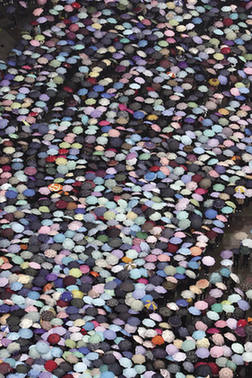| A Chinese Economist's View of the Global Financial Crisis
By staff reporter LU RUCAI
Amid the escalating global financial crisis, books on the gloomy topic are flying off the shelves. Which Way Should China Turn – When the Sub-prime Crisis Changed the World gives one Chinese economist's take on the cause and effects of the current crisis – and how one of the world's few growing economies should respond.
LONG before he prepared his preliminary notes for Which Way Should China Turn, Shi Hanbing had earned a reputation as a sharp commentator for the Shanghai Securities News, one of China's leading financial newspapers. His insightful blog attracted a loyal readership of industry professionals and ordinary netizens with an interest in one of the most critical – and complex – subjects of our time.
 |
|
Which Way Should China Turn |
Gathering Clouds of Crisis
In January 2009, the value of China's exports was US $90.45 billion – a 17.5 percent decrease on the same period of 2008. In the same month, China spent US $51.34 billion on imports – down 43.1 percent from January 2008. Bilateral trade with its top three trading partners, the EU, the US and Japan, was down across the board. If this weren't worrying enough, legions of newly unemployed migrant workers and job-hungry graduates meant that the government needed to find solutions to stabilize a slowing Chinese economy.
Why, exactly, is China so badly affected by the downturn, since the trigger was pulled by the sudden collapse of a property market many miles away – America's sub-prime crisis? Shi Hanbing thinks the reason is simple: China's economy is export-driven, and when the sub-prime fallout threw much of the West into recession, its citizens responded by curbing consumption of clothes, TVs and other "luxuries" – much of which is produced in China. And though shifts in government fiscal and monetary policy have helped to curtail the damage resulting from crumbling export markets, many export-oriented enterprises have found themselves struggling to survive.
The author also contends that do-mino rounds of bailout plans unleashed in Western economies have had a serious impact on China's economy. To fund its US $800 billion financial rescue package, the United States intends to issue more treasury bonds and print more dollars. The EU has also earmarked funds to the tune of €2.2 trillion to save its spluttering economy. Shi Hanbing asserts that Western eco-nomies' gain from seigniorage – revenue derived by issuing currency – has been reserve-holders' loss, and China is one of those suffering.
Shi cites the fact that China holds massive US dollar and euro reserves – by the end of 2008, the total value of its forex reserves was US $1.95 trillion, with the bulk of that in dollar deposits and bonds. But if the US and Europe continue to print money, the value of China's reserves will quickly shrink. Though China currently holds more than US $700 billion in American treasury bonds, it could be experiencing "negative returns" as the US' increased currency supply drives down the dollar's value.
 |
|
Job-hungry people flock to a job fair through the rain in Zhejiang Province.
China Foto Press |
| 